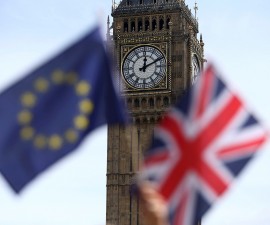HARI SREENIVASAN, PBS CORRESPONDENT: Earlier today, I sat down with Swati Dhingra. She's an economist at the London School of Economics, and she has been studying potential impacts of the Brexit ever since the referendum was announced.
HARI SREENIVASAN: It's not theoretical anymore.
SWATI DHINGRA, LONDON SCHOOL OF ECONOMICS: Oh, absolutely not. It was never theoretical, but now I think it's — earlier it was a possibility, now it is a reality.
Just to give you sort of ballpark numbers of what we think the impact will be, the next five years after the Brexit, we should expect GDP to decline by about 1 percent to 3 percent. One percent decline in British GDP means 720 pounds lower income per household per year. And this is a permanent effect that you will see.
So these are not trivial effects. These are going to have – these are going to affect the lives of people, their economic prosperity, and especially those of young people who will be entering the job market now.

HARI SREENIVASAN: You said that there's going to be costs to people that are entering the job market now. What are those?
SWATI DHINGRA: So what we know from sort of work, which has mainly been done for the U.S., that during the economic downturns, the cohorts that's entering the job force at the time – so, say, think of young college graduates. They tend to earn lower wages that year, of course, because there is just lower demand in that year. So wages are more depressed. And that's about a 6 percent to 8 percent drop in wages if you enter during an economic downturn. By economic downturn, I mean there's 1 percent higher unemployment than usual.
HARI SREENIVASAN: OK.
SWATI DHINGRA: And that effect doesn't go away. The large, persistent negative effects of wages on young college graduates if they enter during a downturn, even 15 years afterwards, they have 2.5 percent lower income. So in that sense, these are persistent effects which stay with the younger population, and they are the ones who will be growing up with that.
Within the U.K., what I think is also really important is that life of universities is going to be under threat. At the moment, what the U.K. has with the rest of the European Union are these programs to have exchanges. And they're very, very active programs. Those are going to come into question.
HARI SREENIVASAN: Does this make it harder for employers to recruit?
SWATI DHINGRA: We're already seeing that happen. As the uncertainty develops, I think people are going to be on a hiring freeze. And it is going to have an impact on the pool of skilled workers available in the country. At the moment, if, say, you are a legal firm, you can hire any lawyer from anywhere in the E.U. That pool is going to get much smaller, and that is going to impose costs on businesses in terms of who they are able to hire.
…small businesses … are concerned about this issue as well. If you wanted to, say, recruit teachers, are you okay with now suddenly hiring an E.U. immigrant teacher? And how about these English teachers who go to Spain? I think all of those things have already started happening.












